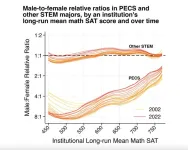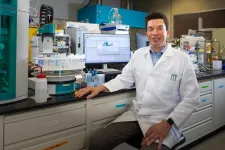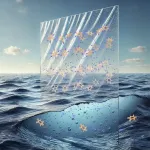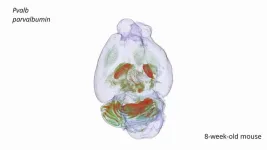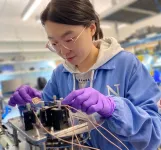(Press-News.org) A new study on ageing in the animal kingdom has highlighted how urgently Earth’s oldest and wises creatures must be protected, with knowledge and environmental stability lost due to human intervention.
The new study, led by Charles Darwin University’s (CDU) Research Institute for the Environment and Livelihoods (RIEL), explores the consequences of the loss of old, often large and wise animals in the wild and the value these individuals have to scientific knowledge, biodiversity and more.
Humans are responsible for the decline of these animals. The review explains how in freshwater and ocean environments, the oldest age-classes of fish have been depleted in most populations, and extremely old corals are being harvested and are irreplaceable within human lifespans.
On land, poaching, trophy hunting, predator hunting and recreational harvests are responsible for the loss of other types of old animals. On land and sea, old animal decline is also caused by habitat loss, disease, extreme climate events.
Lead author Dr R. Keller Kopf, an ecologist and senior lecturer with CDU and RIEL, said older animals offer unique biological functions and ecological knowledge, and provide important services humans rely on.
“In addition to their intrinsic biodiversity value and slower rate of recovery in response to human activities, the loss of old animals ultimately threatens the long-term sustainability and stability of ecosystems on which humans depend,” Dr Kopf said.
“They are especially important for ecosystem services such as fisheries whereby old individuals appear to provide the stability to populations, yet they are selectively harvested”
Dr Kopf said these older individuals offer insights into a variety of areas, including reproduction, behaviour, knowledge and social structures, and their roles in ecosystems.
“Old individuals of long-lived species such as elephants, whales and humans accumulate knowledge over long time-periods, and - among many other benefits - this allows them to provide better care of their off-spring or grand-offspring,” Dr Kopf said.
“In some of these species, especially humans, grandmothers increase the probability of grand offspring surviving and going on to reproduce. In fish and other cold-blooded animals, older individuals generally continue to grow throughout life, and this allows them to increase the number of offspring they produce.”
Dr Kopf said management strategies and policies would need a long-term approach, into years and decades, for the successful conservation of these animals.
“A new method of conservation management and policy is required, which we refer to as ‘longevity conservation’,” Dr Kopf said.
“The International Union for the Conservation of Nature Red List, and United Nations Convention on Biological Diversity must begin to recognize ‘longevity depletion’ a global threat to biodiversity and the sustainability of life on Earth.
“Fisheries management agencies should develop policy and assessment approaches to recognise and prevent ‘longevity overfishing’ - it is currently not recognized as a type of overfishing but is a likely cause of fisheries collapse and increasing volatility.”
The study was conducted with an interdisciplinary team of researchers from the University of Exeter, Charles Sturt University, Macquarie University, the Amboseli Trust for Elephants in Kenya, University of Stirling, and Texas A&M University.
Loss of Earth’s old, wise and large animals was published in the journal Science.
END
Oldies but goodies: Study shows why elderly animals offer crucial scientific insights
2024-11-21
ELSE PRESS RELEASES FROM THIS DATE:
Math-selective US universities reduce gender gap in STEM fields
2024-11-21
Nationally, men in colleges and universities currently outpace women in earning physics, engineering, and computer science (PECS) degrees by an approximate ratio of 4 to 1. To better understand the factors driving these gaps, NYU researchers analyzed bachelor’s degrees awarded in the US from 2002-2022, and found that the most selective universities by math SAT scores have nearly closed the PECS gender gap, while less selective universities have seen it widen dramatically.
“These findings challenge our understanding of gender inequality in STEM education,” says Joseph Cimpian, the study’s lead author and professor of economics and education ...
Researchers identify previously unknown compound in drinking water
2024-11-21
A team of researchers from the United States and Switzerland have reported the discovery of a previously unknown compound in chloraminated drinking water. Inorganic chloramines are commonly used to disinfect drinking water to safeguard public health from diseases like cholera and typhoid fever. It’s estimated that more than 113 million people in the United States alone drink chloraminated water.
The researchers have now identified chloronitramide anion, chemically expressed as Cl–N–NO2−, as an end product of inorganic chloramine decomposition. While its toxicity is not presently known, its prevalence and similarity to other ...
Chloronitramide anion – a newly characterized contaminant prevalent in chloramine treated tap water
2024-11-21
Many public water systems in the United States use inorganic chloramines to disinfect drinking water, but their decomposition products have long been a mystery. In a new study, researchers report the discovery of chloronitramide anion – a compound whose existence, though not identity, has been known for 30 years. Detected in the tap water of millions of Americans, this compound’s toxicity remains untested, prompting calls for immediate toxicological evaluation and raising questions about the safety of chloramine in public water supplies. For over a century, chemical disinfection of public water ...
Population connectivity shapes cultural complexity in chimpanzees
2024-11-21
Cultural complexity in chimpanzees depends on migration and interaction between groups, echoing early human patterns of cultural evolution, researchers report in a new study. The findings offer insight into the development of cumulative culture in early hominins. Culture, defined as a set of socially learned behaviors, has been increasingly documented across various animal species. However, human culture stands out for its complexity and cumulative nature, where cultural knowledge builds upon previous innovations. While chimpanzees – humans’ closest relatives – demonstrate a variety of cultural ...
Direct hearing tests show that minke whales can hear high-frequency sounds
2024-11-21
For the first time, scientists have directly measured the hearing range of minke whales, discovering that the species can detect high-frequency sounds as high as 90 kilohertz (kHz), according to a new study, demonstrating hearing sensitivity far greater than previously believed. The findings suggest that baleen whales – the planet’s largest mammals – may be even more impacted by anthropogenic ocean noise than currently recognized but have been excluded from regulatory consideration due to underestimated hearing ranges. ...
Whale-ship collision risk mapped across Earth’s oceans
2024-11-21
By mapping global ship traffic and whale habitats, researchers found that 92% of whale habitats overlap with shipping routes, illuminating hotspots for whale-ship collision risk, according to a new study. Although only 7% of high-risk areas currently contain management strategies to reduce ship strikes, the findings show that expanding efforts to just 2.6% of the ocean’s surface could significantly reduce these fatal collisions, aiding whale conservation amid booming global shipping. “Mitigating the negative environmental impacts of marine shipping is essential ...
Bye-bye microplastics: new plastic is recyclable and fully ocean-degradable
2024-11-21
Researchers led by Takuzo Aida at the RIKEN Center for Emergent Matter Science (CEMS) have developed a new durable plastic that won’t pollute our oceans. The new material is as strong as conventional plastics and biodegradable, but what makes it special is that it breaks down in seawater. The new plastic is therefore expected to help reduce harmful microplastic pollution that accumulates in oceans and soil and eventually enters the food chain. The experimental findings were published Nov 22 in Science.
Scientists have been trying to develop safe and sustainable materials that can replace traditional plastics, which are non-sustainable and harm the environment. While ...
Unveiling nature of metal-support interaction: AI-driven breakthrough in catalysis
2024-11-21
How can Artificial Intelligence (AI) help accelerate scientific discovery based on vast amounts of experimental data? A new study by Prof. LI Weixue's team from the University of Science and Technology of China (USTC) of the Chinese Academy of Sciences shows how this can be achieved in heterogonous catalysis. The results were recently published in Science.
By integrating interpretable AI with experimental data, domain knowledge, and first-principles simulations, the researchers established a general theory of metal-support interaction (MSI), which is one of the most important pillars in catalysis.
Supported metal catalysts ...
New imaging method enables detailed RNA analysis of the whole brain
2024-11-21
Researchers at Karolinska Institutet and Karolinska University Hospital have developed a groundbreaking microscopy method that enables detailed three-dimensional (3D) RNA analysis at cellular resolution in whole intact mouse brains. The new method, called TRISCO, has the potential to transform our understanding of brain function, both in normal conditions and in disease, according to the new study published in Science.
Despite great advances in RNA analysis, linking RNA data to its spatial context has long been a challenge, especially in intact 3D tissue volumes. The TRISCO method now makes it possible to perform three-dimensional RNA imaging of whole ...
Stability of perovskite solar cells doubled with protective coating
2024-11-21
Northwestern University scientists have developed a new protective coating that significantly extends the life of perovskite solar cells, making them more practical for applications outside the lab.
Although perovskite solar cells are more efficient and less expensive than traditional silicon solar cells, perovskite has, until now, been limited by its lack of long-term stability. Typically, perovskite solar cells uses an ammonium-based coating layer to enhance efficiency. While effective, ammonium-based layers degrade under environmental stress, such as heat and moisure.
Northwestern ...
